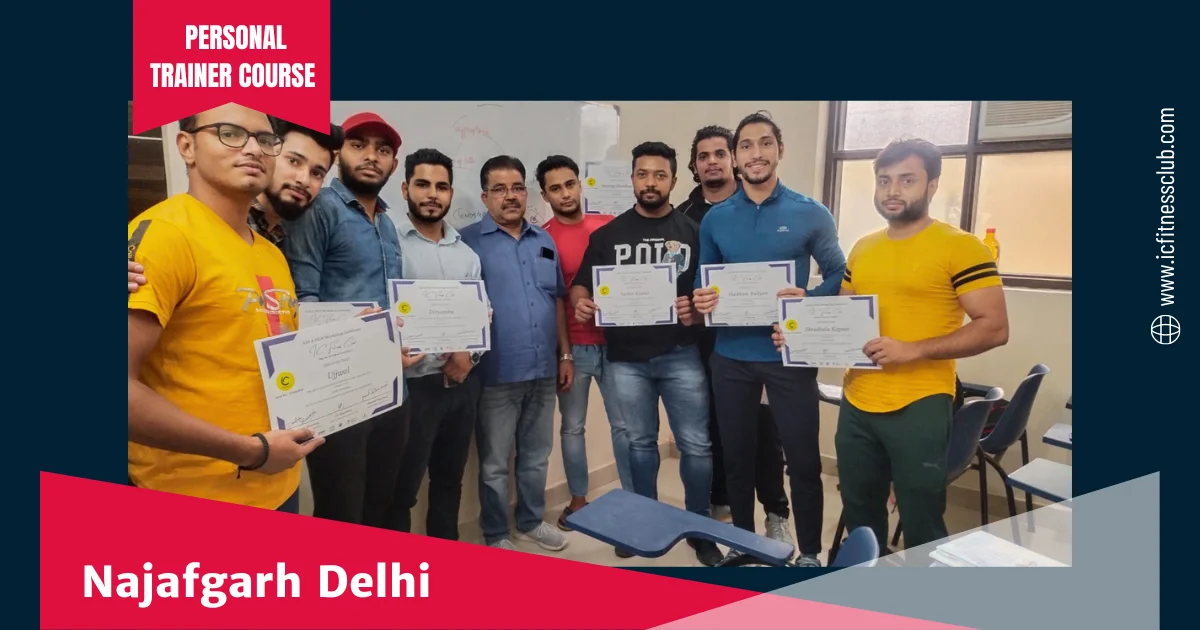Personal Trainer Course in Najafgarh Delhi – IC Fitness Club
A personal trainer course in Najafgarh Delhi is a program designed to provide individuals with the knowledge and skills needed to become certified personal trainer. These courses typically cover exercise science, anatomy, physiology, nutrition, and fitness programming.
Upon completion of a personal trainer course, individuals are typically required to pass IC’s certification exam to become a certified personal trainer. This certification demonstrates that the individual has the knowledge and skills needed to design safe and effective exercise programs, provide instruction and guidance to clients, and motivate clients to achieve their fitness goals.
Syllabus of Personal Trainer Course
Here is a sample syllabus for a personal trainer course:
I. Introduction to Personal Training
- Overview of personal training profession
- Certification requirements and options
- Professional standards and ethics
II. Anatomy and Physiology
- Overview of human anatomy and physiology
- Skeletal and muscular systems
- Cardiovascular and respiratory systems
- Nervous system
III. Exercise Science
- Principles of exercise physiology
- Biomechanics of human movement
- Kinesiology and functional anatomy
- Adaptations to exercise
IV. Nutrition
- Basics of nutrition and macronutrients
- Micronutrients and hydration
- Understanding dietary supplements
V. Client Assessment and Programming
- Client consultation and assessment
- Fitness assessment protocols
- Programming for health and fitness goals
- Special considerations for working with specific populations
VI. Exercise Technique and Program Design
- Resistance training techniques and program design
- Cardiovascular training techniques and program design
- Periodization and progression
- Exercise modification and regression
VII. Communication and Motivational Techniques
- Effective communication skills for personal trainers
- Motivational interviewing
- Behavior change strategies
VIII. Legal and Professional Considerations
- Liability and legal considerations for personal trainers
- Business and marketing considerations for personal trainers
- Professional standards and ethics
IX. Certification Exam Preparation
- Overview of the certification exam
- Practice exam questions and review
X. Continuing Education
- Importance of continuing education and professional development
- Available resources for continuing education
Note that this is just a sample syllabus and may not reflect the specific content or structure of all personal trainer courses. It’s important to research and review the syllabus of any personal trainer course you are considering to ensure it covers the topics and skills you need to become a successful personal trainer.
Scope in the fitness industry
The fitness industry is a rapidly growing and dynamic industry with a wide range of career opportunities. Here are some of the key areas where there is a scope in the fitness industry:
- Personal Training: Personal trainers work with individuals to create customized exercise and nutrition plans to help them achieve their fitness goals.
- Group Fitness Instruction: Group fitness instructors lead group exercise classes such as yoga, cycling, and dance-based workouts.
- Strength and Conditioning Coaching: Strength and conditioning coaches work with athletes to improve their performance in specific sports.
- Health Coaching: Health coaches provide guidance and support to help individuals make lifestyle changes to improve their overall health and well-being.
- Physical Therapy: Physical therapists work with individuals who have suffered injuries or have medical conditions that affect their movement and mobility.
- Sports Medicine: Sports medicine professionals work with athletes to prevent and treat injuries related to physical activity.
- Fitness Management: Fitness managers oversee the day-to-day operations of gyms and fitness centers.
- Fitness Technology: Technology is increasingly being used in the fitness industry to track progress, monitor health and fitness, and enhance the workout experience.
- Nutrition and Dietetics: Nutritionists and dietitians work with individuals to develop nutrition plans that support their health and fitness goals.
Overall, the fitness industry offers a variety of career opportunities that cater to individuals with different skills and interests. With increasing awareness of the importance of exercise and healthy living, the demand for fitness professionals is expected to continue to grow in the coming years.
Requirements to become a certified personal trainer
some common requirements are:
- Minimum age: You must be at least 18 years old to become certified as a personal trainer.
- Education: A high school diploma or equivalent is typically required.
- CPR/AED certification: Most certification organizations require that you hold current certification in CPR (cardiopulmonary resuscitation) and AED (automated external defibrillator) use.
- Certification Exam: You must pass IC’s certification exam that covers topics related to personal training, such as anatomy, exercise physiology, and program design.
- Continuing Education: Most certification organizations require that you earn continuing education credits to maintain your certification.
The responsibilities of a certified personal trainer typically include:
- Assessing Client Needs: Personal trainers begin by assessing the fitness level and health history of clients, taking into account their goals, limitations, and medical conditions.
- Creating Customized Programs: Based on the information gathered during the assessment, personal trainers develop customized exercise and nutrition plans to help clients achieve their goals.
- Demonstrating Proper Technique: Personal trainers demonstrate and teach clients proper exercise techniques to ensure that they are performing exercises safely and effectively.
- Providing Motivation and Support: Personal trainers provide motivation and support to help clients stay on track with their fitness goals, offering positive reinforcement and constructive feedback as needed.
- Tracking Progress: Personal trainers track client progress over time, adjusting their program as necessary to ensure that clients are making progress towards their goals.
- Providing Education: Personal trainers provide education to clients on a variety of topics related to health and fitness, including nutrition, exercise physiology, and injury prevention.
- Ensuring Safety: Personal trainers ensure that clients are exercising in a safe and appropriate manner, monitoring clients for signs of fatigue, discomfort, or injury.
- Maintaining Professionalism: Personal trainers maintain a high level of professionalism at all times, adhering to professional standards and ethics and maintaining client confidentiality.
to know further about IC’s Personal Trainer Course, Visit Below-





